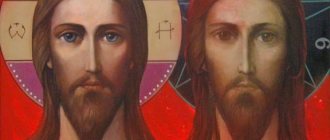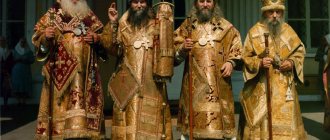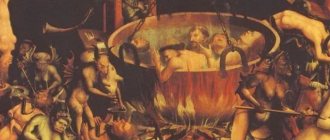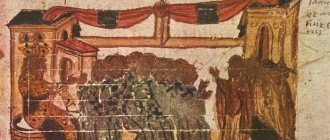Bible Questions and Answers
Published 05/27/2011
Our topic today is the deacon (deacon) in the church and their role according to the Bible. We have several questions from our readers, to which the church teacher, Douglas Jacobi, gives his answers.
A little theory
A deacon is the first level of priesthood in the Church. All priests were first deacons. A deacon differs from a priest in that he cannot independently serve the liturgy and perform the sacraments. During consecration, he kneels on one knee; this is an image of the fact that he is not entrusted with full priestly service, but only part of it: he has the right to serve at the Holy Mysteries, but cannot perform them.
The deacon embellishes the service with his voice and assists the priest. He proclaims litanies, reads the Holy Scriptures - the Gospel, and if there are two deacons at the service, then the Apostle - participates in censing and performing some liturgical actions. Most deacons have good voice and hearing. This is especially true for those who serve under the bishop: during bishop's services there are many hymns that are sung in the altar, therefore, in order for the service to be beautiful, one must sing well and competently.
In addition to his liturgical duties, the deacon is responsible for the cleanliness of the altar, the appearance of the service, and the safety of church vessels and utensils. There are places in the altar that sextons cannot touch - this is the Throne, it is in the center, the antimins lies on it, and the Altar - it is located to the side, on which they perform proskomedia. They can only be touched by priests and deacons, who are responsible for the cleanliness of these sacred places.
History of appearance in Christianity
A deacon (this is a more correct church pronunciation instead of the worldly “deacon”) is a minister, in contrast to a priest, who is the performer of church sacraments and divine services. Therefore, a priest can perform divine services without a deacon, but a deacon cannot perform divine services without a priest.
"Deacon." Ryabushkin Andrey Petrovich
The history of the appearance of this lower degree of priesthood in the Orthodox Church dates back to apostolic times. In the early Christian Jerusalem Church there was a pious, voluntary communion of property. When its rich members sold their estates and donated money to poor Christians. So, in particular, these donations went to support widows (widows), who in ancient times were usually the most needy.
However, after some time, the Jews of the Diaspora, called Hellenists, began to grumble against the Jews of Jerusalem, believing that their widows were being discriminated against during the distribution of these benefits. The holy apostles, not wanting to give up preaching the word of God and prayer for the sake of caring for the tables:
“They chose Stephen, a man full of faith and the Holy Spirit, and Philip, and Prochorus, and Nicanor, and Timon, and Parmenes, and Nicholas of Antioch, a convert from the pagans; They were placed before the apostles, and when they had prayed, they laid their hands on them” (Acts 6:5-6).
All of these deacons, except the last one, are not only canonized, but are also apostles of the seventy. Especially glorified is the holy Archdeacon Stephen, who became the first martyr. Those. the first of the Christians to accept martyrdom for Christ during persecution from the Jews (Acts 7: 54-60).
And during his martyrdom, St. Stephen:
“Being filled with the Holy Spirit, he looked up to heaven and saw the glory of God and Jesus standing at the right hand of God, and said, “Behold, I see the heavens opened and the Son of Man standing at the right hand of God” (Acts 7:55-56).
The Holy Fathers talk about it this way. The Lord showed heaven open to the first martyr so that all the martyrs of Christ who followed him would know that the gates of the Kingdom of Heaven were open for them and free entry into heaven was not prohibited. This means that after their martyrdom they freely enter heaven without going through ordeal. This family of saints has such an extraordinary gift from God!
As we know, even the greatest reverend fathers, ascending to heaven, did not escape the ordeal. What can we say about ordinary sinners, whose souls are tested after death at twenty terrible demonic “outposts”. Where the unfortunate soul is met by fierce demons, presenting her with lists (charters) of her sins and frantically wanting to plunge her into the very depths of hell! And all this, by the grace of God, the holy martyrs of Christ avoid; ascending to heaven is not forbidden. This is how great the feat of martyrdom is, as the first martyr Archdeacon Stephen revealed to us for the first time.
And he revealed another very important Christian commandment in his feat. When the Jews stoned him, he did not ask God in Jewish to reward them “an eye for an eye or a tooth for a tooth,” he did not ask to hit them all with fire from heaven, but he prayed for them like this: “Lord! Do not hold this sin against them” (Acts 7:60), teaching us to forgive our enemies, even the most sworn ones.
After all, with his prayer the saint could actually bring down fire from heaven and strike to death those who beat him. But then there would not have been the future Apostle Paul, who, in the form of the Pharisaic youth Saul, was among these Jews, guarding their clothes (Acts 7: 58). And this means that:
“The blood of martyrs is the seed of Christianity.”
But let's return to the seven deacons. There are two opposing opinions about the last of them, Nicholas. Some say that he was distinguished by strict asceticism. But most of the holy fathers claim that he misunderstood the Savior’s teaching about Christian freedom, and therefore preached debauchery and intemperance, laying the foundation for the Nicolaitan sect.
Which is mentioned even in the Apocalypse, where the Lord says the following to the Angel of the Pergamon Church:
“I have a few things against you, because you have there those who hold the doctrine of Balaam, who taught Balak to seduce the children of Israel, so that they would eat things sacrificed to idols and commit fornication. So you also have those who hold the doctrine of the Nicolaitans, which I hate. Repent; but if not so, I will come to you quickly and fight with them with the sword of My mouth” (Rev. 2: 14-16).
I think this second opinion about the seduction of Nicholas of Antioch into this false teaching, given that he, unlike the first six deacons, was not canonized by the Church, is true.
Does the deacon only help during services?
A deacon may have obediences outside of the service. Depending on the place of service, he is an assistant to the priest or bishop. A deacon can also engage in administrative work in the parish, volunteer activities, and teach in Sunday school. It all depends on his talents and the needs of the parish. Personally, I serve under the bishop, so I have specific responsibilities. I am an employee of the chancellery of the Gorlovka diocese, and also the sacristan of the Epiphany Cathedral, which is directly related to my diaconal service: I am responsible for the decoration of the church.
You probably noticed that all holidays in our Church have their own color: Easter - red, Christmas - white, Trinity - green, Mother of God holidays - blue, and so on. On the eve of the festive service, everything in the altar is decorated in the appropriate color. I am responsible for this, as well as for ensuring that everything in the cathedral is clean and tidy. In addition to the above, I am obedient to a photographer: I photograph holiday services, the bishop and priests of our diocese. When there is a need, I perform the duties of a subdeacon. Subdeacons help the bishop during the service: they hold books, serve special candlesticks - trikiri and dikiri, and so on. I am the eldest over the subdeacons, I am responsible for ensuring that everything is in order, but I can replace them myself if necessary.
The deacon helps the priest not only at divine services, but also at church services. Like priests, we carry out the week - during the week we are on duty in the temple from morning to evening.
Like priests, deacons have certain degrees. As I already said, the first level of the priesthood is the deacon itself. If he fulfills his duties well and faithfully serves the Church, he can be rewarded by decision of the bishop - elevated to protodeacon. The protodeacon is distinguished by a double orarion (orarion is a narrow ribbon that the deacon wears on his left shoulder).
Current situation in the parishes
Basically, deacons serve with bishops and priests during certain services. This makes them one of the most vulnerable people in the Russian Orthodox Church. After all, as was already said above, a priest can serve without a deacon, which makes the latter in a certain sense superfluous, but, however, in need of support from the parish. Therefore, quite often, especially in poor churches, deacons are discriminated against, offended, and deprived of certain property “buns” in every possible way.
In addition, a deacon, unlike a priest, cannot independently perform services, which are often the main source of income for a clergyman. Therefore, serious problems arise in deacon families, primarily of a material nature.
This is also facilitated by the fables that are widely circulated in the world about the “unusually high incomes of clergy.” But in fact, many deacons, in order to somehow survive, are forced to work part-time in some worldly enterprises.
And so a young girl marries a seminarian, expecting that when he is ordained, he will earn a lot of money. But... a collision with reality very quickly sobers her up, and sometimes (especially in unstable ladies) even more or less forcefully stimulates her to divorce!
Another problem in our society sometimes leads to this. This refers to his depravity, propaganda of various perversions, etc. But members of the families of clergy are required not only to avoid all these nasty things, but also to have additional abstinence even in natural and legal marital relationships. So, at least three nights one should abstain from them before celebrating the liturgy.
And if the deacon himself, as a person to some extent prepared for this, reluctantly can withstand such abstinence, then his young wife - not always. In any case, this is an example. At the parish where I have been serving for the last ten years, there have been seven deacons. And three of them left due to divorce from their mothers, which these mothers demanded of them. And as far as I can tell, they demanded it for the above reasons, material and sexual.
That is why the current statistics come out stating that twenty percent of clergy marriages end in divorce. It is clear that the overwhelming majority of this 20 percent falls specifically on deacon families. So, although in the Church the heads of these families are called “Father Deacon,” these fathers in the Church are quite greatly belittled. And this is a very serious problem for the Russian Orthodox Church! Especially considering that the requirements for this lower degree of priesthood are quite high.
Do you need to study to be a deacon?
To become a deacon, first of all you need to have a desire to serve the Mother Church, and everything else is decided at an interview with the bishop. We know of cases when there were not enough clergy, and a person became a deacon, and then went to study at the seminary in absentia. But it seems to me that it is still better to study full-time. Of course, knowledge can be obtained in different ways, and in this matter everything depends on the person. If he wants, he will study. However, it is advisable for a clergyman to have a classical spiritual education. As a rule, a deacon sooner or later becomes a priest; few people serve as deacons until the end of their lives. So you need to gain knowledge - in order to understand your faith and communicate adequately with people, to know how to answer their questions.
Who can become it
As the Apostle Paul writes:
“Deacons must also be honest, not bilingual, not addicted to wine, not greedy, keeping the sacrament of faith in a clear conscience. And such people must first be tested, then, if they are blameless, they must be allowed to serve. Likewise, their wives should be honest, not slanderers, sober, and faithful in everything. A deacon must be the husband of one wife, a good steward of his children and his home. For those who have served well are preparing for themselves a high degree of excellence and great boldness in the faith that is in Christ Jesus” (1 Tim. 3:8-13).
From this it is quite clear: the demands placed on both the deacon and his mother wife are quite high. Which is clearly dissonant with their rather humiliated position in the Russian Orthodox Church. Particularly difficult due to the above is the requirement to be the husband of one wife. According to which, a deacon can marry (before his ordination) only once.
But if, for the above-mentioned material and sexual reasons, the wife leaves him, despite the husband’s categorical reluctance to give a divorce, then the poor father deacon becomes guilty without guilt. He cannot remarry, and he cannot live without a female wife. What remains for him?!
To be honest, either depose yourself and get married. Or accept monasticism and become a hierodeacon. By the way, I have talked more than once with deacons abandoned by their wives, offering them the option of monasticism. But there was only one answer: no, I can’t! Which, in fact, is logical. After all, Christian marriage in our time is the strongest and, often, for many, the only means of avoiding fornication.
And if this marriage is destroyed through the fault of the wife, then the poor deacon will continuously be subjected to increased blows from the demon of fornication, one way or another periodically falling into this sin. What for him, as a minister of the Sacraments, especially the Eucharist, constantly receiving communion and consuming the Holy Gifts, is spiritually extremely difficult, and sometimes simply unbearable!
What is the way out? I think it is about involving the Church in public and social service, in which the deacon can play a very important role. After all, as mentioned above, they cannot independently perform the services (which, as a rule, priests are busy with in their free time from service) - therefore, they potentially have enough time and energy, like younger people, to undergo the above service. Some should be well paid.
This achieves several goals at once. Firstly, the deacon will receive additional and, preferably, sufficient income from the Church, and not from worldly labors; secondly, his social importance will increase, which will generally have a positive effect on his family life. Finally, thirdly, if the wife nevertheless leaves such a deacon, then church life for him will not be over. He can marry again, and, although according to strict canons he will be prohibited from serving as a deacon, he can continue to engage in the above-mentioned social activities.
Is it necessary for a deacon to become a priest?
A deacon does not have to become a priest. If a person does not want this, no one will force him. Before becoming a priest, a deacon writes a petition addressed to the bishop: “I ask for the blessing of Your Eminence to ordain me to the rank of priest to serve God and the Church.” It is clear that if he does not write, no one will do it for him.
A bishop can offer ordination to a deacon, but this does not mean that one cannot refuse. Usually such issues are resolved in a personal conversation with the bishop, who has extensive experience communicating with people in general and clergy in particular and therefore sees who is ready to minister to the flock and who is not yet. The priest spends a lot of time with parishioners, his task is to be able to find an approach to different people, to choose the right words for everyone. The deacon helps the priest to a greater extent than communicates with parishioners.
How to apply correctly
It is customary to address a deacon as “father (name)” or “father deacon.”
How many are there now in the Russian Orthodox Church?
According to data provided at the end of November 2022 by His Holiness Patriarch Kirill, there are 4,640 full-time deacons in the Russian Orthodox Church. It is easy to understand that this is a sufficiently strong force for the above-mentioned beneficial activities. The only question is how to use this power expediently and wisely?!
The second lever in solving this problem of deacons is to prepare their future mothers. For this purpose, there were special institutions in the pre-revolutionary Church. In particular, girls and young women, usually the daughters of clergy, were prepared for this, frankly speaking, sacrificial feat (to be the wife of a deacon or priest) in special courses.
Then balls were held, in which these girls, as well as seminarians looking for their future mother, took part. We got acquainted, love arose - spiritual and carnal, but, of course, we did not allow ourselves anything reprehensible before legal marriage. Then they got married in church, and walked hand in hand throughout their lives.
By the way, the mothers in those courses also received the profession of a nurse or midwife, which was very useful in a remote rural parish, where newly minted clergy were usually initially sent. So I think that it would be very useful to restore such an institution for educating future mothers in the present Church!
By the way, there is such a funny, semi-anecdotal case associated with these pre-revolutionary courses for girls and balls. At one of the last, a certain seminarian, let’s call him Ivan, met a pretty girl whom he really liked. It seemed that love was arising between them, and Ivan was already ready to offer his beloved his hand and heart. But... after a while she told him: “Forgive me, Vanya, I fell in love with Kolya and tomorrow I’m marrying him.” Upset in his most intimate feelings, Ivan... ended up becoming a monk.
Much time passed and he became a bishop. And Kolya is a priest, Father Nikolai. And it had to happen that this bishop was sent to head the diocese in which Father Nicholas served.
According to the customs of that time, all the clergy of the diocese, together with their mothers, had to be presented to the new bishop. And so the poor aforementioned mother, waiting for her turn to perform, was tormented in her heart, not knowing what to say to the former Vanya, who became a bishop, whom she had rejected at one time.
I thought and thought, and finally came up with an idea. Approaching the bishop under the blessing, she said: “You see, Vladyka, if I had not refused you then, you would not have become a bishop.”
To which the Bishop answered her in a thick bishop’s bass: “Fool! If God wanted me to become a bishop, then I would have married you, and then you would have died!”
Jokes aside, but it would be very useful to establish such an institute for educating future mothers in the Russian Orthodox Church! For this lower level of the priestly rank must under no circumstances be neglected. If only because church history testifies to the holiness of many of them.
Saints who served in this rank
In addition to the first six of them listed above (Acts 6:5), let us name a few more names of these saints: Venerable Macarius, Deacon of Pechersk (January 19/February 1); Martyr Luke (January 29/February 11); New Martyrs Tryphon (February 14/27) and Simeon (February 15/28); Martyr Valens (February 16/March 1) and many, many others. Finally, let's point out:
What character qualities should a person have who wants to be a deacon?
You need to have the same qualities as priests, because in essence they are the same ministry. If we start directly from the tasks, then the deacon must love order and cleanliness. Cleanliness in the altar is our main concern, because it is the holy of holies. If a deacon is not characterized by cleanliness and he always forces himself to do what he does, then sooner or later some mistakes will occur, omissions will occur.
Discipline, decency, and education are also important in our ministry. You must be able to help people with wise and kind words, and support them in different situations. It is very important to know the Holy Scriptures well and constantly study them. It is very ugly when you are an altar server, walking around in a cassock, but cannot answer people’s questions. In short, a deacon is a special ministry that requires constant development, as well as responsibility towards oneself and others.
Protodeacon Mikhail Ilchuk
Deacon
Who is a deacon (minister)? Now let’s try to understand the terminology and consider
A deacon is a person who performs a minor function in the church environment. That is, this is a kind of lower level in the hierarchy. The history of the origin of this rank is very interesting. Initially, deacons provided selfless help to people. That is, their responsibilities included helping orphans, widows, and poor families; fighting injustice; distribution of money that has been designated for good causes. All this was done so that the clergy, who were directly involved in the rituals, would give their all and devote themselves to this action, without being distracted by other matters.
By the way, a woman could also be a deacon. She was supposed to help orphans. She also cared for the sick and prepared people for the sacraments that were held in the church.
There are a kind of steps to this rank - these are subdeacon, hierodeacon and protodeacon. The oldest is the last one. The archdeacon has the most privileges and opportunities.
Responsibilities
So, we learned that a deacon is a minister of the church. We also found that it does not perform any significant function. Now let's figure out what the responsibilities of a deacon are.
He takes direct part in the actions carried out by the priest. It is also he who distributes incense throughout the temple before the sacraments. The church leadership strives to ensure that the deacon performs as many functions as possible. Most strive to do their job well.
This will subsequently provide an opportunity to achieve a higher rank. Also, the duties of this minister include washing the attributes of church sacraments. Deacons should prepare for communion and help conduct some rituals.
Diaconate that is misunderstood
Having shared with you the view of Scripture on the ministry of diakonia, I now want to present erroneous views that I have found in our churches. And you will already clearly see what their infidelity and even danger are.
Deacon – the grise eminence of the church
I have heard the following saying in the world: “He who has the wallet is in charge.” Therefore, pastors sometimes control all the finances of the church. But this should not be the case in the Body of Christ.
In a healthy church, finances are collected and accounted for by deacons. They distribute them for the affairs and needs of the church. At membership meetings they regularly give an account down to the last penny. But this does not mean at all that deacons lead the community and have the final say on financial matters.
The finances and material resources of the church are also the sphere of spiritual leadership, the sphere of pastoring. Money and equipment are given to the church for no other purpose than to invest in two areas: the spiritual development of church members and their evangelism to the world. These are the core values, and pastors determine that this is where funds should be spent.
But sometimes deacons become directors who determine what the church will and will not do. And instead of helping the church grow spiritually or evangelize, deacons act like business executives who need to ask permission. They dominate people, manipulate them, turn into gray cardinals - and, without thinking about the purpose of the church, they hinder its development.
Our deacons know better than I the flow of funds in our community and sometimes say that we do not yet have funds for some projects. But instead of prohibiting, refusing and slowing down initiatives because there is no money and people, wise deacons are moved by faith: they call on God for help, look for opportunities, develop strategies for increasing resources, and discuss with the church how to achieve God’s goals.
Silent Deacon
This, I would say, is the other extreme: a deacon who is always in the role of a younger brother. Traditionally, in our churches, all authority is given to the elders, and deacons are perceived as their assistants. Although biblically this is not so: both elders and deacons are one strong team of employees.
I have also seen fatalistic deacons in communities whose credo is: “I’m a small man, if they say so, I’ll do it.” They themselves try not to offer anything in particular, silently waiting for them to be told what they need. Like apprentices in the wings. They may be good performers, but that's not what diaconal ministry looks like. After all, a deacon is a leader who cares about the entire community. He looks for opportunities for its development, cares for people, takes initiative because he loves the church.
Deacon in transit
Another mistake: thinking that the diaconate is a step on the path to the pastorate. I call this a “temporary deacon.” He is in this service, as it were, in transit. He needs it to gain attention and move to a “higher level.”
This mistake has even become part of the tradition of our churches: before being ordained to the pastoral ministry, a brother is first ordained to the deaconate. I don’t know, maybe they did this for humility, to test their brother in practical work. But the result was not good - the diaconal ministry was no longer perceived as important and worthwhile.
Diaconate and pastorate are not career steps, but two completely independent ministries, different areas of giftedness and callings for life.










